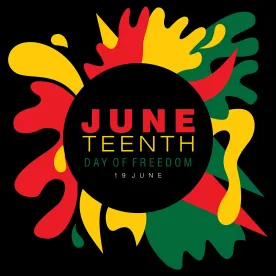When President Biden signed the bill on June 17 which made Juneteenth (June 19) a federal legal holiday immediately, it impacted certain Regulation Z timing requirements related to rescission of closed-end mortgage loans and the TILA-RESPA Integrated Disclosures (TRID), particularly with respect to transactions that either (i) closed on or before June 17, 2021 but for which consumers’ rescission periods had not yet expired or (ii) were close to the planned closing date on June 17, 2021 and subject to certain disclosure timing requirements of the TRID provisions. Since the CFPB did not publish immediate guidance, mortgage lenders were forced to make educated guesses as to how to treat Friday, June 18 and Saturday, June 19, particularly with respect to measurement periods that had already commenced before or on the date the new law became effective. On August 5 the CFPB published an interpretive rule on how to deal with these issues, and the Bureau consistently reached a result that permitted mortgage lenders to treat June 19 as either a business day or a federal holiday for the purposes of these provisions, as set forth immediately below in more detail.
-
In the context of the 2021 Juneteenth federal holiday and the affected closed-end rescission and TRID provisions, if the relevant time period began on or before June 17, 2021, then June 19. 2021 is a business day. If the relevant time period began after June 17, 2021, then June 19, 2021 is a federal holiday. This is consistent with the specific business day definition set forth in 5 USC 6103(a). Therefore, lenders did not have to worry about treating some loans that had their relevant time period commencing on June 17 differently from other loans that had their relevant time periods commence on June 17, based on the time President Biden signed the new law.
-
For calculations of the rescission period, if the period commenced on or before June 17, then June 19 is a business day, but for compliance purposes a creditor may provide the consumer with a longer rescission period, so if the creditor treated June 19 as a federal holiday (and thereby ended the rescission period a day later), that will also be correct. If the rescission period commenced on June 18, then June 19 should have been treated as a federal holiday.
-
For delivery of the Loan Estimate, creditors must deliver the LE to consumers or place it in the mail no later than seven business days before consummation of the transaction. Again, if the delivery period began on or before June 17, then June 19 was a business day, but for compliance purposes the creditor may provide the LE earlier than seven business days before consummation, so if the creditor treated June 19 as a federal holiday (and thereby had the consummation period end a day later), that will also be correct. If the delivery period commenced on June 18, then June 19 should have been treated as a federal holiday.
-
Regulation Z permits the creditor to provide the consumer with the Loan Estimate and the Closing Disclosure by mail if not delivered personally. The applicable disclosure is deemed to have been received by the consumer three business days following its placement in the mail. So if the disclosure was placed in the mail on or before June 17, then June 19 is treated as a business day for the purpose of when the disclosure is deemed received by the consumer, but the creditor will also be considered compliant if it treated June 19 as a federal holiday when calculating the deemed received date (and thereby had the deemed received date occur a day later). If the disclosure was placed in the mail June 18, then June 19 should have been treated as a federal holiday when calculating the deemed received date.
-
Finally, Regulation Z provides that a revised LE must be received by the consumer no later than four business days prior to consummation, and a revised Closing Disclosure (CD) must be received no later than three business days prior to consummation. While these measurement periods begin on the actual date of receipt, as opposed to the date of delivery, there is also a mail rule for delivery of these revised disclosures, so the consumer is considered to have received the revised LE or CD three business days after it is placed in the mail. So, if the revised disclosure was placed in the mail on or before June 17, then June 19 would have been a business day for the purposes of the deemed received date, but once again, since creditors may provide the revised LE or CD earlier than required, if would also be correct for the creditor to treat June 19 as a federal holiday when calculating the deemed received date (and thereby had the deemed received date occur a day later). If the revised disclosure was placed in the mail on June 18, then June 19 should have been treated as a federal holiday when calculating the deemed received date.






 />i
/>i

